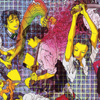[Hyperdub]
Hyperdub’s sudden embrace of Laurel Halo was unexpected — an instinctive decision by Kode9, a forward-thinking leap into the dark. Apart from Ikonika, whose penchant for challenging, colorful forms could be considered distantly related, there is no artist in the electronic world who is making anything like the knotty, flat plains of Quarantine. After the fractured synth pop of 2010’s King Felix EP and the muffled techno of 2011’s underrated Hour Logic EP, Laurel Halo seems to have arrived at the edge of her vision, where rounded harmonies interlock with and fray against a heady, romantic haze; beatless ambience on which her vocals dance with convincing, awkward poise.
Halo has been upfront about her intention not to use AutoTune on her vocals, leaving them raw and unpolished in the mix, full of the sharp notes and mistakes that tend to arise from emotional overexertion. She attacks melodies with gusto and abandon rather than lack of ability. In March, she told FACT Magazine she decided against the tune-up because of a “brutal, sensual ugliness in the vocals uncorrected.” This theme of “sensual ugliness” runs throughout the album’s aesthetic, from Makoto Aida’s self-harming schoolgirls on the cover to the strange masochism in Halo’s treatment of her voice, often leaving it bone-dry in a mix of soft pads, low-mids, and plodding, percussive sounds that merely hint at rhythm. Like the schoolgirls, Halo commits a kind of harakiri, giving what could have been a muddy, becalmed record a surprisingly confessional edge. But it’s a wordless confession, as her lyrics have vague themes that work against the grain of language, playing against themselves. By the time the album closes with “Light + Space” she is singing “Words are just words that you soon forget,” where previously on “Morcom” she had sung “I got your letter in the morning/I can see you writing,” but we heard nothing of the letter itself. On early listens it seems that “Light + Space” is the runaway success of Quarantine, but like jazz improvisation, Halo’s melodies reward after being lived in, like clothes, and openers “Airsick” and “Years” begin to show their vitality. There is even a swarming quality to one-minute-and-20-second miniature “Wow” that recalls Bjork’s 2004 vocal extravaganza, Medúlla.
Quarantine is a rewarding listen, an ambient thinking space bookended and continually interrupted by genuine feeling. “Hour Logic” and Halo’s recent King Felix project have demonstrated her interest in beats and more purist forms of electronica, proving that, like Actress, she is skilled at arranging lo-fi texture in a painterly, rhythmic way, as well as constructing “songs.” Some may find Quarantine lacking in the focus of her previous work, but like the best ambient music, the appeal of the album is found in its vagueness. Yet for all this it is somehow curt. There is definitely an abandonment of rules at play here — “produced” vocals, even time signatures — but as Halo sings on the closing track, “rules stagnate.”

















Saw laurel halo live recently and have to say whatever talents she may possess and deliver on a recorded piece do not carry over into her live set. It was really poor, the sound of dull rhythms and drones occasionally accompanied by barely audible vocals and once, for about a minute, a 4/4 kick. thoroughly disappointing, considering the hype she has received here and elsewhere.